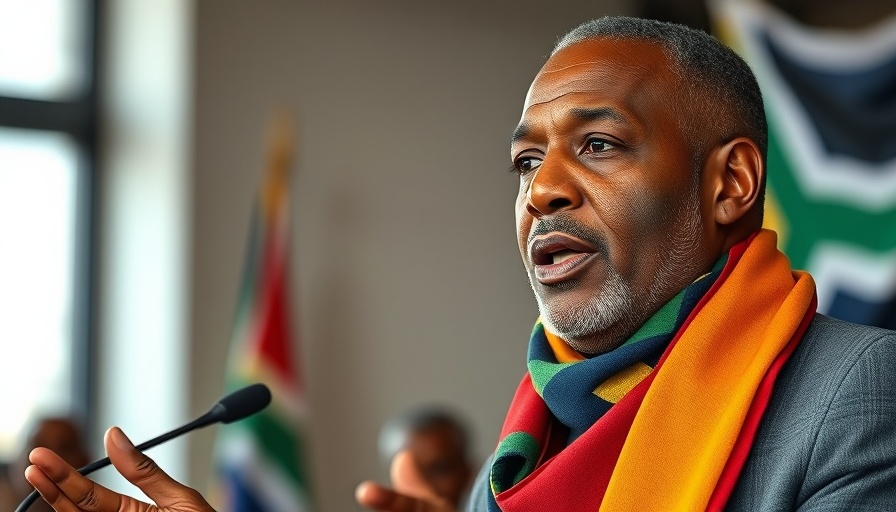
Striking a Balance: South Africa's Diplomatic Dilemma with the US
In the arena of international politics, nations often find themselves in a delicate balancing act, navigating complex relationships that can have profound implications for their sovereignty and economic stability. South Africa's recent experience with the United States illustrates this challenge vividly. Following the controversial tenure of former South African Ambassador to the US, Ebrahim Rasool, and his declaration as persona non grata by Secretary of State Marco Rubio, the discourse on maintaining diplomatic sovereignty has been reignited. This incident has illuminated the expectations placed on South Africa to adopt a more assertive stance in its foreign policy, particularly in relation to the US.
The Consequences of Disagreement
Rasool's dismissal came after he criticized US President Donald Trump's administration, suggesting it was fostering global white supremacy. The backlash was immediate, prompting a discussion on the consequences of such a diplomatic faux pas. Tshepo Matseba, a prominent brand and reputation expert, emphasized the need for South Africa to leverage its diplomatic channel effectively to weather the political storm. He argues that while Rasool's critique may have been valid, the timing and delivery were unwise in an already tense geopolitical climate. The call for a firmer stance from the South African government suggests that the repercussions of Rasool's statements extend beyond individual diplomacy; they reflect broader geopolitical tensions.
Understanding the Stakes
South Africa's complex relationship with the US is underscored by significant economic interdependencies. The US is South Africa's second-largest trading partner; its economic policies and decisions, including the threat of reduced aid, have direct implications for South Africa's financial stability. In 2022, nearly 11 billion US dollars worth of goods were exported from South Africa to the US. With the country grappling with unemployment rates hovering around 32%, any potential deterioration in this relationship could have devastating effects on its economy.
Historical Context: Non-Alignment and Strategic Partnerships
Since the post-apartheid era, South Africa has navigated a non-alignment policy akin to that established by Nelson Mandela. However, the landscape of international relations has shifted considerably, particularly with the emergence of new geopolitical players in the BRICS alliance. As South Africa seeks to enhance its role on the global stage, its historical links to the US and other Western nations are increasingly complicated by its partnerships with countries like China and Russia. This duality reflects a strategic maneuver to reinforce its political and economic sovereignty while navigating pressures from the West.
Future Predictions: Navigating a Complex Landscape
Analysts predict that South Africa will need to refine its diplomatic strategy moving forward. President Cyril Ramaphosa's recent remarks emphasize non-submission to external pressures, mirroring a commitment to solidifying South Africa's role within a multipolar world. This confirms the need for coherent foreign policy that aligns with its national interests while managing relations with the US. The upcoming 2024 general elections may further influence these dynamics, as political realignment occurs within South Africa's governing coalition. With key figures in the ANC, DA, and EFF jockeying for power, the implications of foreign policy decisions will resonate within domestic politics.
Counterarguments: The Case for Resilience
While some critics argue that South Africa's diplomatic challenges stem from an anti-Western sentiment, others posit that they are reflective of a country asserting its sovereignty in a new global reality. The tension with the US, particularly with regards to land reform and historical injustices, raises important questions about how nations can engage with their former colonizers while pushing for meaningful change. This dynamic is essential in understanding South Africa's current diplomatic posture and the potential for future negotiations with the US and other global partners.
Call to Action: Towards a Cohesive Foreign Policy
It is imperative for stakeholders in South Africa, including government officials, political parties, and civil society, to rally around a cohesive foreign policy that reflects shared national interests. A united front will not only bolster South Africa's negotiating position with the US but will also enhance its credibility on the global stage. Engaging in strategic concessions that align with both global and domestic priorities could pave the way for improved relations while preserving the nation’s sovereignty and integrity.
As South Africa steers through these uncharted waters, its ability to maintain independence from foreign contingencies will be crucial for achieving long-term economic stability and nurturing a resilient democracy. Stakeholders must seize this moment to reflect on what it means to assert sovereignty in a turbulent global landscape.
 Add Row
Add Row  Add
Add 




Write A Comment